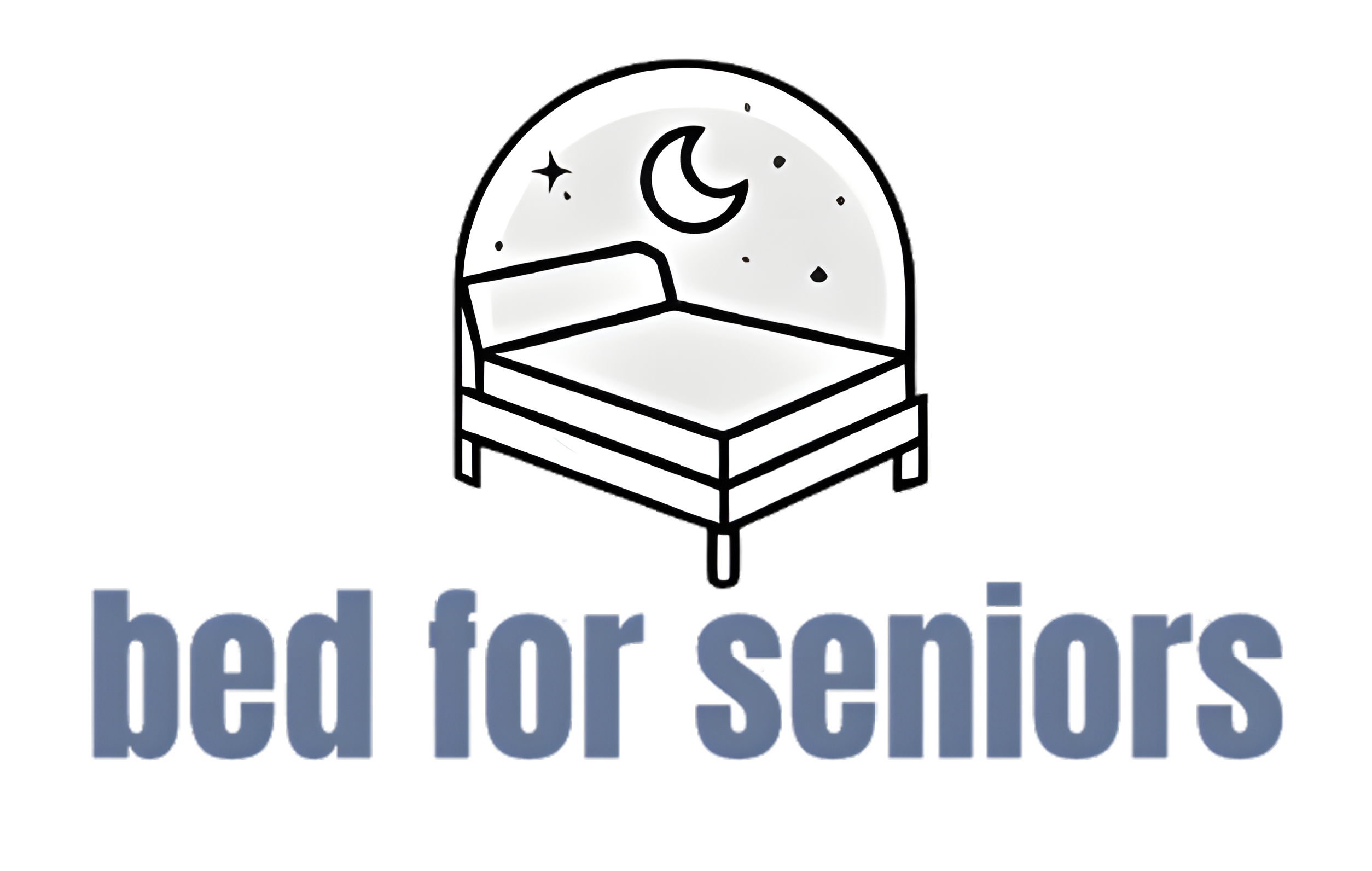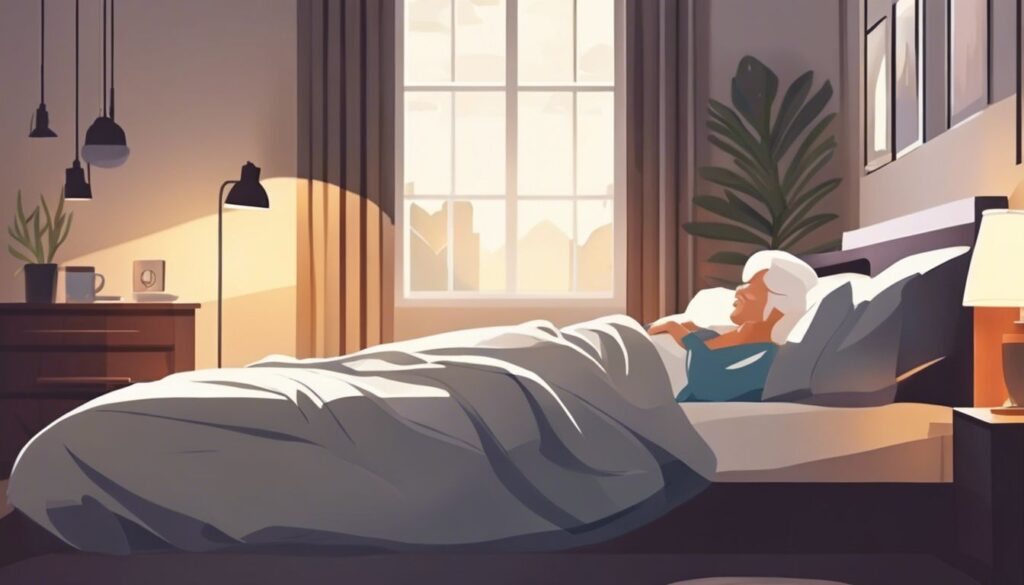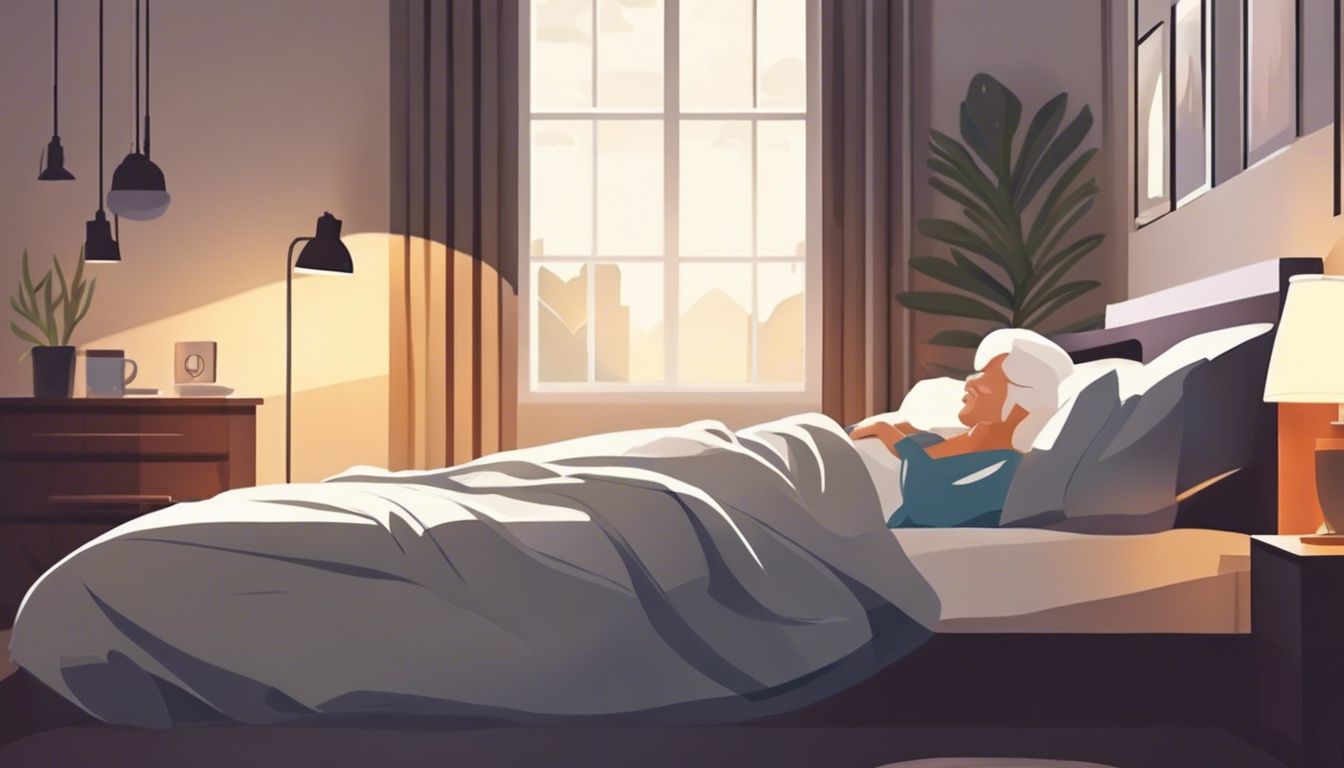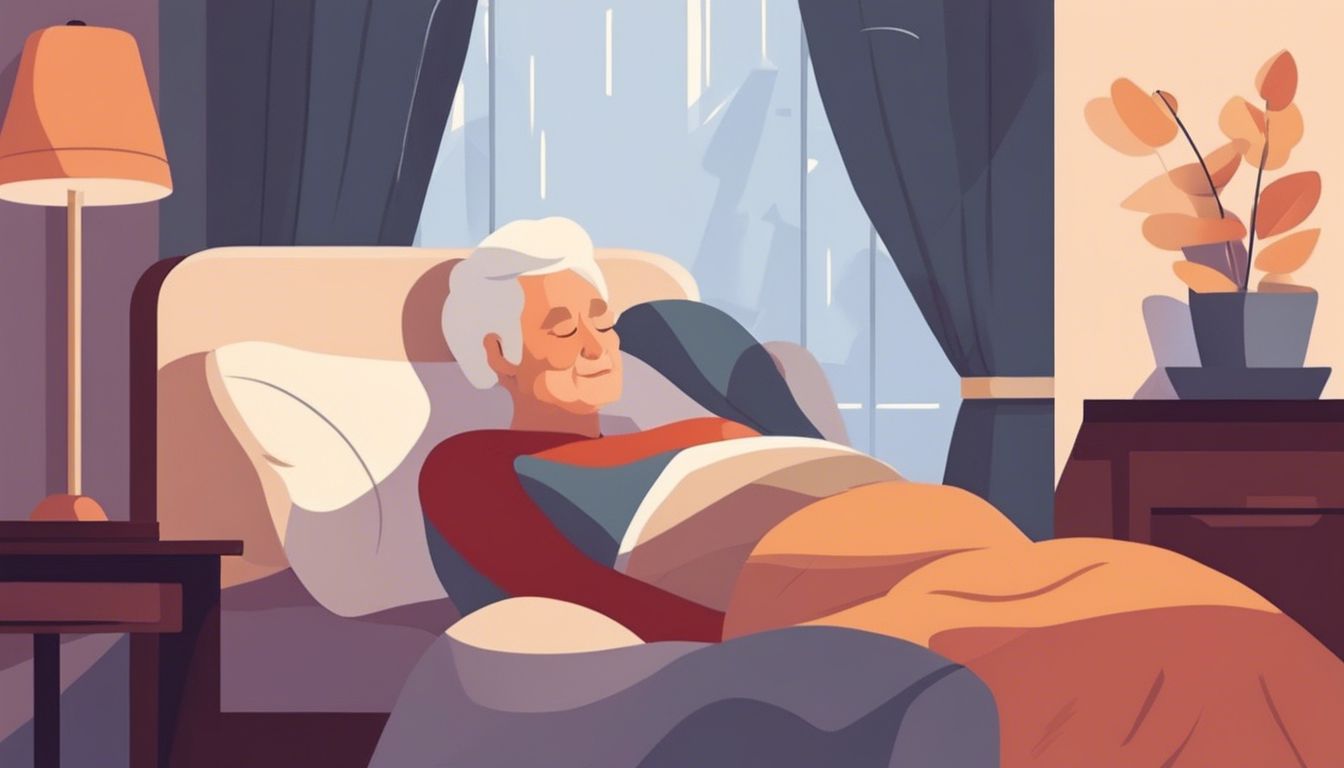Getting a good night’s sleep can be tough as we age. Research shows that older adults need 7-9 hours of sleep each night for optimal health. This blog will explore why sleep matters for seniors and offer practical tips to improve sleep quality.
Ready to catch some Zs?
📋✅
- Seniors need 7-9 hours of sleep per night for optimal health, as good sleep boosts immune function, enhances memory, and regulates mood.
- Common sleep disorders in older adults include insomnia, sleep apnea, and restless legs syndrome, which can significantly impact their quality of life.
- Creating a sleep-friendly environment with a cool temperature (60-67°F), darkness, and quiet can improve sleep quality for seniors.
- Establishing a regular sleep schedule and bedtime routine helps regulate the body’s internal clock and promotes better rest.
- Natural sleep aids like melatonin supplements or herbal teas may help, but it’s important to consult a doctor before trying new supplements.
Key Reasons Why Sleep is Essential for Senior Health

Sleep plays a vital role in senior health. It supports the body’s natural healing processes and helps maintain cognitive function.
Supports immune function
Sleep plays a crucial role in maintaining a robust immune system for seniors. During rest, the body produces and releases cytokines – proteins that help fight infection and inflammation.
Lack of sleep can decrease cytokine production, leaving older adults more susceptible to illnesses.
Good sleep habits also support the production of T-cells, which are vital for fighting off pathogens. Research shows that even one night of poor sleep can reduce T-cell levels in older adults.
This underscores the importance of consistent, quality sleep for senior health and immune function.
Sleep is that golden chain that ties health and our bodies together. – Thomas Dekker
Enhances memory and concentration
Quality sleep plays a crucial role in boosting memory and sharpening focus for older adults. Research shows that during deep sleep, the brain consolidates information from short-term to long-term storage, strengthening neural connections.
This process is vital for seniors, as it helps combat age-related cognitive decline and supports better recall of daily tasks and important events.
For caregivers, understanding this link between sleep and mental acuity is essential. Encouraging consistent sleep patterns can lead to improved cognitive function in older adults under their care.
Adequate rest also enhances problem-solving skills and decision-making abilities, which are key for maintaining independence in senior years. Next, let’s explore common sleep disorders that can affect older adults and disrupt these vital cognitive processes.
Regulates mood and emotional health
Sleep plays a crucial role in emotional well-being for seniors. Inadequate rest can lead to irritability and depression, affecting daily life. Research shows a strong connection between poor sleep, insomnia, nightmares, and depressive symptoms in older adults.
Caregivers should note that reduced activities of daily living may explain the link between sleep problems and mood disorders in seniors.
Good sleep hygiene supports mental health and helps manage stress. Regular, quality rest allows the brain to process emotions and maintain balance. This emotional regulation is vital for seniors facing changes in their lives and health.
Next, let’s explore common sleep disorders that affect older adults.
Common Sleep Disorders in Older Adults
Sleep disorders plague many older adults, affecting their health and quality of life. Insomnia, sleep apnea, and restless legs syndrome are common issues that can disrupt sleep patterns and lead to daytime fatigue.
Insomnia
Insomnia plagues many older adults, disrupting their sleep patterns and overall well-being. This common sleep disorder can manifest as difficulty falling asleep, frequent nighttime awakenings, or waking up too early.
Seniors with insomnia often experience daytime fatigue and anxiety about bedtime, impacting their quality of life.
Persistent tiredness lasting more than 2-3 weeks signals the need for medical attention. Interestingly, seniors’ expectations about sleep medication can increase their likelihood of regular use.
This highlights the importance of exploring non-pharmacological approaches to manage insomnia in older adults.
Sleep is the golden chain that ties health and our bodies together. – Thomas Dekker
Sleep Apnea
Moving from insomnia, another common sleep disorder in seniors is sleep apnea. This condition causes breathing to stop and start repeatedly during sleep. Loud snoring and daytime drowsiness are telltale signs.
Left untreated, sleep apnea can lead to serious health issues like high blood pressure, stroke, and memory problems.
Caregivers should be alert to these symptoms in their elderly loved ones. Treatment options exist, ranging from breathing devices to surgery. Continuous Positive Airway Pressure (CPAP) machines are often prescribed.
They keep airways open during sleep. In some cases, dental appliances or surgical procedures may be recommended. Early detection and treatment are crucial for maintaining senior health and quality of life.
Restless Legs Syndrome
Restless Legs Syndrome (RLS) plagues many older adults, causing an irresistible urge to move their legs. This condition often strikes at night, disrupting sleep and leading to daytime fatigue.
RLS symptoms include tingling, crawling, or aching sensations in the legs that temporarily ease with movement.
Caregivers can help manage RLS by encouraging regular exercise, maintaining a consistent sleep schedule, and avoiding caffeine before bedtime. Warm baths, leg massages, and relaxation techniques may also provide relief.
In some cases, a doctor might prescribe medications to alleviate symptoms and improve sleep quality.
Practical Tips for Improving Sleep in Seniors
Improving sleep for seniors involves simple yet effective strategies. Regular bedtimes, quiet rooms, and natural remedies can make a big difference. Learn more about these practical tips to help older adults get better rest….
Establishing a regular sleep schedule
Consistency is key for better sleep. Caregivers should help seniors stick to a fixed bedtime and wake-up time, even on weekends. This routine helps regulate the body’s internal clock, making it easier to fall asleep and wake up naturally.
A steady sleep pattern also supports the body’s circadian rhythms, which influence hormone production and other vital functions.
Creating a pre-sleep ritual can signal the body it’s time to wind down. This might include light stretching, reading, or listening to soft music. Avoid screens an hour before bed – the blue light can disrupt sleep hormones.
Encourage seniors to limit daytime naps to 20-30 minutes, preferably before 3 PM, to prevent nighttime sleep disturbances. These habits can improve sleep quality and duration, boosting overall health and well-being for older adults.
Creating a sleep-conducive environment
Creating a comfortable sleeping space is crucial for seniors. The bedroom should be cool, quiet, and dark. Set the thermostat between 60-67°F (15-19°C) for optimal sleep. Use blackout curtains or an eye mask to block light.
White noise machines can mask disruptive sounds. Remove electronic devices from the bedroom – their blue light disrupts sleep patterns.
Safety is paramount in a senior’s sleep environment. Install smoke alarms and ensure windows and doors are secure. Use nightlights to prevent falls during nighttime bathroom trips.
A firm, supportive mattress and pillows can ease back pain and improve sleep quality. The next section will explore natural sleep aids that complement a restful bedroom setup.
Considering natural sleep aids
Natural sleep aids can offer a gentler approach to improving sleep quality for seniors. Melatonin supplements, often derived from plants, may help regulate the body’s sleep-wake cycle.
Herbal teas like chamomile or valerian root have calming properties that could promote relaxation before bedtime. However, it’s crucial to remember that these aren’t cure-alls for insomnia.
Caregivers should prioritize healthy bedtime habits over relying solely on sleep aids. Creating a consistent sleep schedule, reducing screen time before bed, and ensuring a comfortable sleep environment are more effective long-term strategies.
Always consult a geriatrician before introducing any new supplements, as they may interact with existing medications or health conditions.
Best Sleep Positions for Seniors with Back Pain
Seniors with back pain can find relief through proper sleep positions. Lying on the back with a pillow under the knees helps maintain the spine’s natural curve and reduces pressure on the lower back.
Side sleeping, with a pillow between the knees, keeps the spine aligned and minimizes discomfort. These positions support the back, promote better rest, and may alleviate pain associated with conditions like arthritis or spinal stenosis.
For those with chronic back issues, avoiding stomach sleeping is crucial. This position can strain the neck and lower back, exacerbating existing problems. Caregivers should encourage seniors to experiment with different sleep positions and use supportive pillows to find the most comfortable arrangement.
Creating a sleep-conducive environment is the next step in improving sleep quality for seniors.
Sleep plays a vital role in the health and well-being of older adults. Quality rest supports immune function, sharpens memory, and regulates mood. Addressing common sleep issues like insomnia can greatly improve seniors’ quality of life.
Simple changes – like sticking to a bedtime routine or creating a cozy sleep environment – can make a big difference. Prioritizing good sleep habits helps older adults stay healthy, alert, and engaged as they age.
FAQs
1. Why is sleep important for seniors?
Sleep is vital for seniors’ physical health and mental well-being. It helps with tissue repair, protein synthesis, and memory consolidation. Good sleep also lowers the risk of heart disease, diabetes, and Alzheimer’s disease.
2. How much sleep do older adults need?
The National Sleep Foundation recommends 7-9 hours of sleep for older adults. However, many seniors struggle with insufficient sleep or fragmented sleep patterns. This can lead to feeling tired during the day and trouble concentrating.
3. What causes sleep problems in the elderly?
Several factors can disrupt seniors’ sleep-wake schedules. These include chronic illnesses, medications, stress, and changes in the body’s internal clock (suprachiasmatic nucleus). Conditions like obstructive sleep apnea and periodic limb movement disorder (PLMD) are also common culprits.
4. How does poor sleep affect senior health?
Sleep deprivation in seniors can lead to weight gain, increased risk of cardiovascular disease, and memory loss. It also impacts the body’s inflammatory response, potentially worsening chronic diseases. Lack of sleep may even contribute to social isolation and mental health issues.
5. What can seniors do to improve their sleep?
Establishing a consistent bedtime routine can help. Exposure to sunlight during the day, regular exercise, and avoiding caffeine late in the day are beneficial. For persistent issues, cognitive behavioral therapy for insomnia might be recommended by sleep medicine specialists.
6. How can caregivers help seniors with sleep problems?
Caregivers and professional carers play a crucial role. They can help maintain a regular sleep-wake schedule, ensure a comfortable sleep environment, and monitor for signs of sleep disorders. They should also be aware of nighttime urination needs and assist accordingly.









